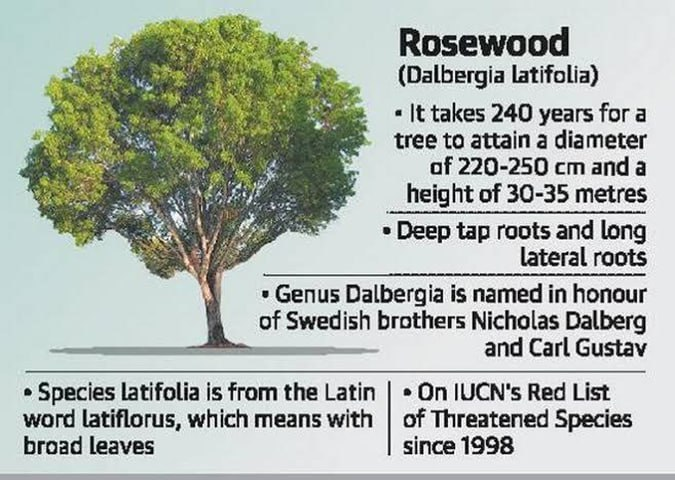PREVIOUS
Indian Rosewood Trees
September 4 , 2025
15 hrs 0 min
26
0
- The Tamil Nadu government did not renew the Tamil Nadu Rosewood (Conservation) Act, 1995, beyond February 2025.
- Indian rosewood (Dalbergia latifolia) is native to Tamil Nadu’s Nilgiris, Anamalai, and Parambikulam ranges.
- Only 17.2% of India’s suitable habitat for Indian rosewood lies within protected areas.
- Rosewood trees improve soil fertility through nitrogen fixation.
- They support bird and insect diversity and act as long-term carbon sinks.
- Recent field studies from 2019 to 2025 show Tamil Nadu have 2.85 rosewood trees per 0.1 hectare.
- Karnataka and Kerala recorded higher densities with 6.19 and 5.38 trees per 0.1 hectare, respectively.
- Populations in Tamil Nadu are dominated by mature, ageing trees with almost no natural regeneration.
- Seedlings of rosewood are rare or absent in many areas of Tamil Nadu.
- The Conservation Act prohibited cutting rosewood without government permission until it lapsed in 2025.
- Private rosewood trees, especially in Nilgiris tea plantations, are at risk without legal protection.
- Habitat modelling identified Nilgiris, Coimbatore, Erode, Tiruppur, Dindigul, and Theni as core districts for rosewood.
- Indian rosewood is listed under Appendix II of the Convention on International Trade in Endangered Species of Wild Fauna and Flora (CITES).
- The species has been classified as Vulnerable by the International Union for Conservation of Nature (IUCN) since 2018.
- India’s last national assessment in 2011-12 listed Indian rosewood as Near Threatened.

Leave a Reply
Your Comment is awaiting moderation.


